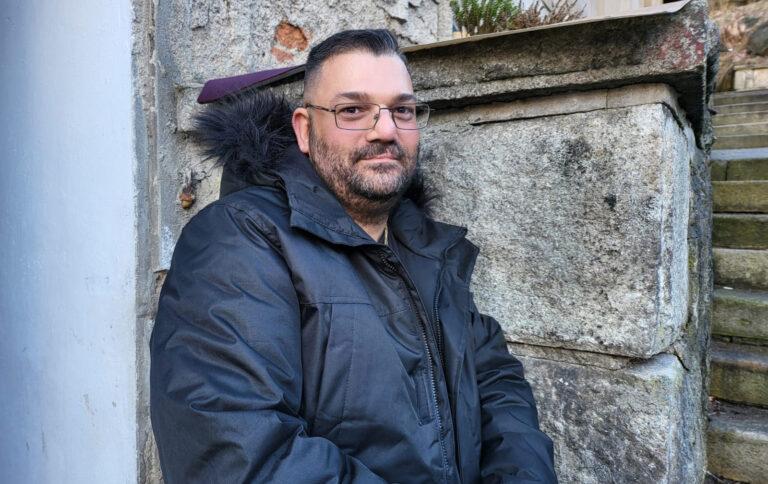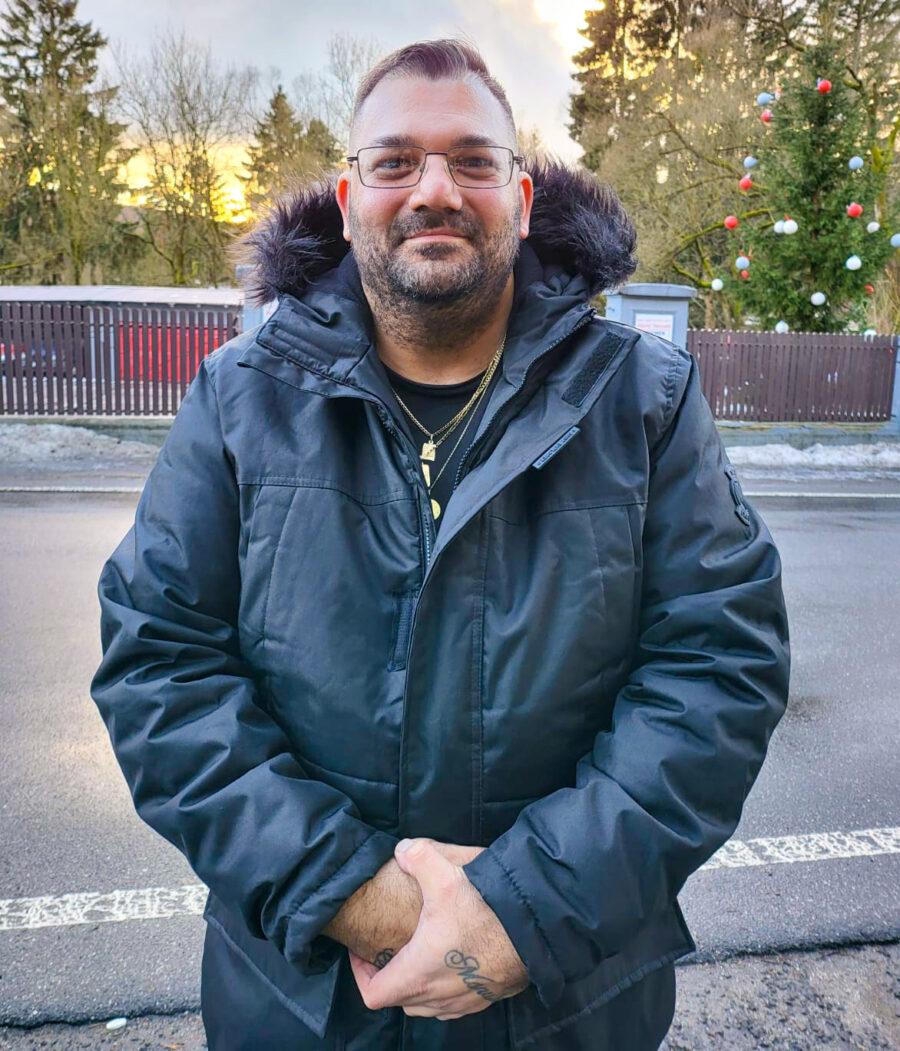Patrik Kotlár: When my father found out I am gay, he beat me brutally, but today I help other LGBT+ Romani people

Patrik Kotlár's coming out was not easy, encumbered as it was by discrimination and his own family's incomprehension. Instead of giving up, though, he decided to overcome those obstacles and use his experience to aid others.
He established the nonprofit organization Romany Art Workshop 13 years ago, offering arts workshops, educational programs to develop community activism and leadership, and sports activities in Tanvald, Czech Republic. He also collaborates with the ARA ART organization.
In November 2023 the two organizations opened a community club in Jablonec nad Nisou and will open another in Frýdlant. These clubs will become places for members of the LGBT+ minority to meet each other and give each other support, as well as places for Romani people from excluded localities to gather.
Patrik (36) is inspiring to those who want to overcome such obstacles themselves and become the voices of change. “As a schoolchild I myself was not aware of my sexual orientation. My schoolmates told me what they thought, though,” he starts his story.
The insults he endured were unpleasant and he believed his friends were absolutely crazy. He did not begin to realize what his sexual orientation was until the age of 16, as a high school student studying social work.
He did not decide to come out until two years later, when he began his first partner relationship. He met his then-boyfriend on a train.
It never even occurred to him that anybody around him might take a negative view of his being gay. “While I had been raised my whole life in the Christian spirit of a man belonging to a woman, I never worried about that for myself. I accepted my orientation as a fact and I never thought that it was supposed to be wrong,” he admits.
He began visiting a gay bar in Liberec after fully realizing and admitting his orientation. He and his friends enjoyed going to the disco there.
One day, however, a group of Romani people who knew his father saw Patrik leaving that bar and immediately informed his father. “Dad was unable to stomach it and he beat me brutally for it,” Patrik says, adding that it is still difficult for him to talk about what happened.
Being outed to his father by others was the beginning of the end for him, and he found himself in total isolation, cut off from contact with most of his family and former friends. The suddenness of the situation also had a negative impact on his studies because he was forced to drop out just before graduation.
“I was afraid my father might even kill me unless I left Liberec,” he says. He was on the run from his father’s aggression for more than a year, hiding in various locations all over the country, but his father always managed to track him down.
“Whether I hid in Plzeň, Brno, Pardubice or the capital, my father always found out where I was at the time. It was exhausting, I lived in constant fear that he would find me and harm me. In his eyes I had caused the entire family unreal shame. However, nobody else in my family reproached me for my orientation and accepted me without any problems,” he said.
A childhood without a mother
When Patrik speaks of his family, he does not mean his mother, because he got no support from her as he was growing up. His mother abandoned the family when he was nine.
Patrik says his mother was an alcoholic and, after disagreements with his father, who wanted her to stop drinking, she always left the family for some time before eventually returning. She never gave up drinking.
One day she left for good and the family never saw her alive again. “My childhood was sad without my mother, to this day I say I basically never had a childhood,” Patrik recalls.
“Dad was older when we were born, and he raised us with a strict hand. As children we were never allowed to go anywhere besides school and music lessons, we had no personal space,” he reminisces.
Patrik never managed to re-establish contact with his mother. He heard from acquaintances more than once that she was homeless in Košice, Slovakia, and another time that she was in Bratislava, but when he and his sister went there, they were unable to find her.
One day an older sibling who had long since flown the nest let them know they needed to meet in Brno and immediately head for Slovakia because their mother was dying and wanted to see everybody one last time. They did not hesitate and set off after her at once.
She passed away half an hour before they made it to Bánovec nad Bebravou. “I was 17 then, and even now it is difficult for me to speak about this out loud,” Patrik says before falling silent for a moment, and it is apparent that the loss of his mother is still an unhealed wound for him.

Patrik’s father’s health was also not the best. Since they had last been in contact he had developed symptoms of Alzheimer’s and other diseases.
“He asked my sister to send a message to me to come home and that he wouldn’t do anything bad to me. I obeyed and our relationship actually improved. It took a while for him to reconcile himself to my orientation and get used to my boyfriend at the time, but he didn’t shout abuse at either of us or attempt to harm us in any way. Ultimately my sister, my then-boyfriend and I took care of my father in his most difficult moments. He died nine years ago today,” he says.
Aiding others is the priority
His personal experience of discrimination in his family led Patrik to establish the Romany Art Workshop nonprofit organization 13 years ago. The organization concentrates on aiding adults and children grappling with social exclusion.
The NGO prepares primary school pupils to apply to high school, offers recreational activities and summer camps, and holds arts workshops which will be transformed this year into an academy for talented youth. The academy will concentrate on the arts and music and its instruction will be comparable to that of an arts school at the primary level.
The main aim of the NGO, however, is to lead local Romani people to emancipate themselves with the aid of community activism and leadership training. Patrik is convinced it is important to show Romani youth the opportunities that exist to engage in public affairs and to create new activities in the places where they live.
Patrik says he believes individuals can contribute to the better integration of Roma into society through such engagement. He himself is an example.
Before establishing the nonprofit, Patrik led Bengale Manusha, a professional, three-generational ensemble, for two years. On the sidelines, his NGO is working with the LGBT+ minority in the Liberec Region, the members of which are turning to them more and more often.
The decision to fully dedicate the organization to the subject was made after Patrik learned of a tragic event – one such 17-year-old Romani youth took his own life because nobody understood him. “I realized that even though we have personal experience with this, we lack deeper expertise,” he admits.
For that reason, he decided to collaborate with the ARA ART organization, which has long concentrated on the LGBT+ subject. Thanks to their collaboration, they were able to open a community club in Jablonec nad Nisou in November, where their volunteers had previously been working.
People from neighboring towns like Tanvald or Železný Brod seek out their services. Soon a club will also open in Frýdlant.
As in Jablonec, that club will provide expert counselling to LGBT+ Romani people. A psychotherapist is also available there to aid clients not just with coming out, but to also answer parents’ questions when they want to learn more about the LGBT+ minority.
The organizations currently have 200 clients, 50 of whom are LGBT+. “The community center is not intended just for LGBT+ people, but also for Romani people from socially disadvantaged environments. We provide various recreational activities and because they come here regularly, we believe they like it here,” Patrik boasts, adding that in addition they are endeavoring to build up mutual dialogue in a natural format about overcoming obstacles and creating a safe space for all.
“I am surprised by how the times are gradually changing and how the Roma are more open to same-sex couples or to people who are transitioning from male to female and vice versa. What has contributed to this are the different reality shows with gay people as the main protagonists, and we know figures like Jan Bendig. He speaks absolutely openly about his orientation and thousands of Roma from all generations follow him,” Kotlár believes.
Nevertheless, he does perceive differences between the various towns. In Jablonec nad Nisou, which is approximately 14 km from Liberec, Romani people are not disturbed to see two men dancing together during a social event.
In Liberec, on the other hand, there are many gay people who are still in the closet because they have the feeling that those around them are not open toward them. “We will do our best to change that for the better, step by step,” Patrik concludes optimistically.